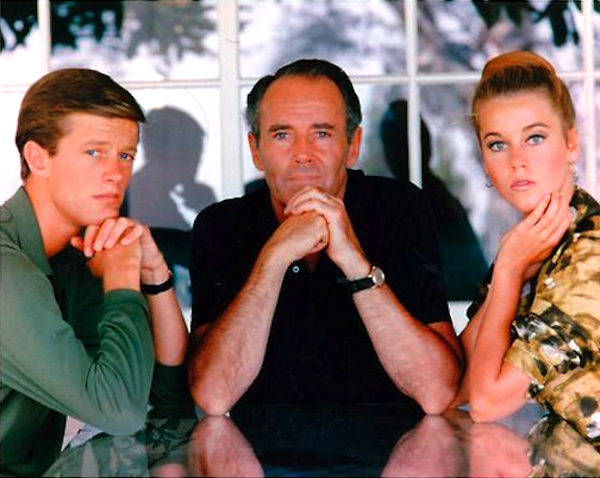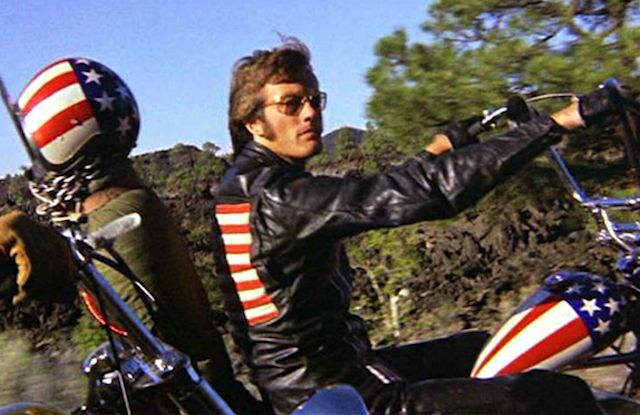LOSANGELES– Peter Fonda, part of Hollywood acting royalty, had many memorable roles in his long career. But he will forever be known as the “Easy Rider,” the 1969 feature (coincidentally, the film was the number one film exactly 50 years ago today) that ushered in a new wave of filmmaking. Portraying a biker named Captain America, his character was “born to be wild” as he motored across the country. Peter Fonda died in Los Angeles due to complications of lung cancer. He was 79.
Peaceful, Easy Rider: Peter Fonda in Chicago, January 28, 2010.
Photo credit: Joe Arce of Starstruck Foto for HollywoodChicago.com
Peter Henry Fonda was born into the family of film star Henry Fonda, three years after his sister Jane. He studied acting at the University of Nebraska Omaha, starting in the same community playhouse where his father started. He moved onto Broadway in the early 1960s, and began doing episodic television during the era. His film debut was in “Tammy and the Doctor” (1963), and was nominated for a Golden Globe (Most Promising Newcomer) the same year for “The Victors.”
Coming of age in the mid-1960s, it was clear that Fonda would not follow his father into conventional leading man roles, as he joined the counterculture that was emerging, was open about his drug use and grew his hair long. In 1966, he famously gave John Lennon a key lyric inspiration for his song, “She Said She Said,” when he told the Beatle – while they were tripping on LSD– that he knew “what it’s like to be dead” … he was referring to a childhood incident when he was accidentally shot.
His film work began to reflect his attitude, as he joined forces with producer Roger Corman to shoot “The Wild Angels” (1966, an early biker film), “The Trip” (1967) and a film with sister Jane “Spirits of the Dead” (1968, directed by Jane’s then-husband Roger Vadim). But it was “Easy Rider” that broke through. This seemingly simple film about bikers finding America revitalized the careers of co-stars Jack Nicholson and Dennis Hopper, and launched a cinema movement that continued into the 1970s, with emerging directors tackling themes of questioning both authority and the American Dream.
Throughout the rest of his career, Fonda emerged as a director (“Wanda Nevada”), cult action star (“Dirty Mary, Crazy Larry”) and spoofer of his image (he portrayed a biker in “Cannonball Run”). He moved into more independent film in the 1980s and ‘90s, scoring a major comeback with “Ulee’s Gold” (1997), portraying a beekeeper within sensitive circumstances. He won a Golden Globe for Best Actor, and was nominated for an Academy Award (he previously had been nominated for Best Original Screenplay for “Easy Rider”).

Hollywood Royalty: Peter Fonda, with Father Henry and Sister Jane in the 1960s
Photo credit: File Photo
Peter Fonda continued to work to the end, most notably “The Limey” (1999), “3:10 to Yuma” (2007) and “The Ballad of Lefty Brown” (2017). He was married three times, lastly to Margaret DeVogelaere, and is survived by two children, including actress Bridget Fonda.
Patrick McDonald of HollywoodChicago.com got the honor of interviewing Peter Fonda in 2010, before he made an appearance introducing “Easy Rider.” The interview is divided into three specific stories and a final commentary regarding Peter Fonda’s famous family. Go to Page Two.
Terry Southern and the ‘Easy Rider’
One of the more mythical stories to come out of Easy Rider is regarding the partnership of author and screenwriter Terry Southern (”Candy,” “Dr. Strangelove”) with Fonda on the story. Since much of what Southern contributed was cut from the film in its final form, Fonda was asked about whether his relationship with Southern at the time was contentious, as the history of the film has been told.
“Jane and I were doing parts in a segment for film ‘Histoires extraordinaires,’ which was directed by her husband at the time, Roger Vadim,” Fonda recalled. “I met Terry Southern at the villa I was staying at in France, and pitched him the idea for the film. He was very enthusiastic and wanted to work on it.”
But there were some obstacles.
“Terry was a pretty big screenwriter at the time, and I thought his price for doing the script would be the entire budget of the film,” Fonda said. “But he was so into the story that we ended up paying him a much lower fee.”
He continued: “It was never a contentious relationship, he just had a problem working with Dennis, who he called ‘Den-Den.’ Hopper and he had some serious confrontations on the New Orleans set and Terry just left. But I never had a problem with him.
And in fact, Terry Southern gave the film its famous title.
“You may think it has something to do with motorcycle riding but what it really refers to is the boyfriend of a prostitute, Fonda said. “She makes all the money and in exchange he gives her love, and the rest is just an ‘easy ride.’”
Captain America on Alternative Fuel
Alternative fuel sources is of great concern to Fonda, one of pop culture’s greatest motorcycle advocates. He spent a lot of last year helping to promote the documentary “Fuel.” As he put it, he had no stake in the film, he just wanted to help spread the message.
“The oil industry has done a good job of keeping alternative fuels out of public use,” Fonda explained. “The Volstead Act of 1920, besides establishing the law that launched Prohibition, was pushed heavily by John D. Rockefeller because it also served to squelched Henry Ford’s ethanol powered engine production, because that was essentially alcohol and against the law.”
“We see that today with bio-diesel, as information that is circulated claims that it is cutting into our food supply,” he added.
But Fonda offered a solution to that, which is a major premise in the documentary.
“Fuel can be made from algae,” Fonda said. “The same factories that pollute our waterways and cause algae to form can now be powered by it.”

Peter Fonda as Captain America in the Classic Film ‘Easy Rider’
Photo credit: Sony Pictures Home Entertainment
Peter Fonda and John Lennon
Historians of The Beatles have long noted that Peter Fonda was the inspiration for one of their greatest songs, “She Said, She Said.” It was in a Benedict Canyon home near Los Angeles that The Beatles stayed during their 1965 tour of America (the Shea Stadium tour). Fonda was in a group of people visiting them in their hideaway. The line that Fonda offered, “I know what it’s like to be dead.” was in reference to a childhood accident where he was shot playing with a gun. Lennon wrote the song one year later that appeared on the “Revolver” Album…
She said, I know what it’s like to be dead.
I know what it is to be sad
“It was glorious days, and I remember them well,” Fonda remembered. “It was great to be part of that experience and great to hear what George Martin and The Beatles came up with when Lennon interpreted that phrase.”
When it was remarked that the phrase and song will have him live forever, Fonda was quick to reply.
“No one lives forever, man.”
The Family Man
Peter Fonda is part of the legacy of the famous Fonda family, with sister Jane and father Henry both major contributors to film history and performance. When asked what his favorite Henry Fonda, Jane Fonda and Peter Fonda movie is, he offered these.
“For my Dad, I love ‘My Darling Clementine,’ just a beautiful picture. For Jane, I have to go with ‘Klute.’ For me, definitely ‘Ulee’s Gold.’
When asked what was the character thread that connected these performances, Peter Fonda went straight to the point.
“They were all real people.”
 | By PATRICK McDONALD |